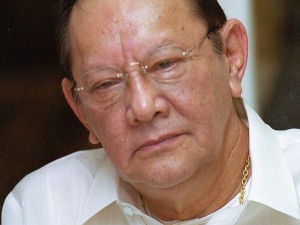MANILA, Philippines—The government has opposed a motion to dismiss the civil case filed against businessman Eduardo ‘Danding’ Cojuangco Jr. who claimed the delay in the disposition of the civil case against him with respect to the coconut levy scandal violated his right to speedy disposition of case.
In a comment-opposition, the Office of the Solicitor-General (OSG) asked the antigraft court to deny Cojuangco’s motion to dismiss.
The OSG denied it was intentionally delaying the disposition of the case and violating the defendant’s right to speedy trial because the delay in the disposition of the case was “not intentional, vexatious and capricious.”
“In this case, it was respectfully submitted that the elements present in the disposition of the case cannot be attributed to the plaintiff,” the OSG said.
It said the delay was precipitated by defendant’s own inaction and legal maneuvering.
“This is not an ordinary run of the mill litigation where a trial could take its natural course and arrive at a predictable and expected resolution,” the OSG said.
“On the contrary, the various amendments in the complaint were the results of painstaking evaluation of voluminous documents and investigative work, all of which required a considerable length of time to accomplish,” it added.
Aside from Cojuangco, named as defendants in the civil case were Agricultural Investors Inc. (AII), Enrique Cojuangco, Marcos Cojuangco, Rafael Abello, Sen. Juan Ponce Enrile and the late former Zamboanga City Mayor Maria Clara Lobregat.
The defendants allegedly conspired to defraud the government in the amount of P426 million invested in the supposed project of AII to produce hybrid coconut seedlings in Bugsuk Island, Palawan, the Presidential Commission on Good Government (PCGG) said.
Cojuangco earlier questioned the Sandiganbayan’s jurisdiction over the case because the complaint does not directly involve recovery of supposed ill-gotten wealth, but a challenge to the validity of an arbitration proceeding.
In this case, the OSG acknowledged that the original civil case was filed on July 31, 1987, and this was amended four times after the court approved the subdivision of the complaint into 10 different complaints at that stage of the proceedings.
